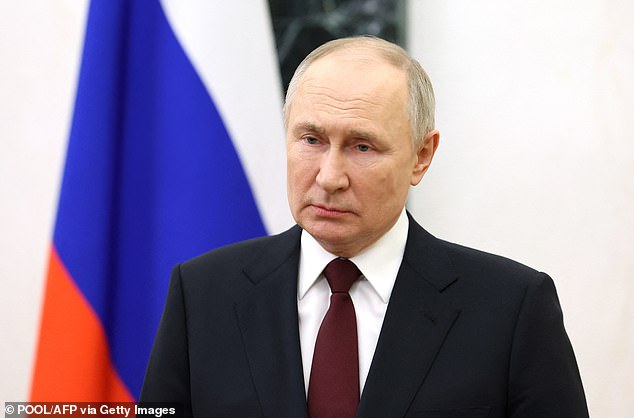The Kremlin warned today that conflict between Russia and NATO would be inevitable if European members sent troops to fight in Ukraine.
French President Emmanuel Macron warned yesterday that European nations have not ruled out sending troops on the ground.
He said nothing should be excluded as the West seeks a strategy to counter Russia, which controls just under a fifth of the territory recognized as Ukraine.
“We will do everything necessary so that Russia does not win,” Macron said.
“The very fact of discussing the possibility of sending certain contingents to Ukraine from NATO countries is a very important new element,” Kremlin spokesman Dmitry Peskov said when asked about Macron’s statements.
Asked about the risks if NATO members sent their troops to fight in Ukraine, Peskov said: “In that case, we would have to talk not about the probability, but about the inevitability (of a direct conflict).”

The war in Ukraine has triggered the worst crisis in Russia’s relations with the West since the Cuban missile crisis of 1962 and President Vladimir Putin had previously warned of the dangers of a direct confrontation between NATO and Russia.
Peskov said the West should ask itself whether such a scenario would be in the interests of its countries and people.
The war in Ukraine has triggered the worst crisis in Russia’s relations with the West since the Cuban missile crisis of 1962 and President Vladimir Putin has previously warned of the dangers of a direct confrontation between NATO and Russia.
Even talk of a confrontation between Russia and NATO – a Cold War nightmare for leaders and populations alike – indicates the dangers of escalation as the West grapples with a resurgent Russia 32 years after the fall of the Soviet Union in 1991.
German Chancellor Olaf Scholz today rejected the idea of European countries and NATO sending troops to Ukraine after Macron said the idea could not be ruled out.
“What was agreed from the beginning between us and each other also applies to the future, namely that there will be no soldiers on Ukrainian soil sent there by European states or NATO states,” Scholz said.
“The UK already has a small number of staff in the country supporting Ukraine’s armed forces, including for medical training,” Prime Minister Rishi Sunak’s spokesman said today.
“We have no plans for a large-scale deployment,” he said, adding: “The UK is also training large numbers of Ukrainian personnel here in the UK. Obviously we also support Ukrainian troops by supplying equipment and supplies.”
Slovak Prime Minister Robert Fico, accused by his critics of being too cozy with Moscow, said after the meeting that there was disunity on the issue among European leaders.
“There are countries that are willing to send their own soldiers to Ukraine, there are countries that say never – Slovakia is among them – and there are countries that say this proposal should be considered,” he said.
It came a day after he said several NATO and European Union members are considering sending soldiers to Ukraine bilaterally.


Macron said nothing should be excluded as the West seeks a strategy to counter Russia, which controls just under a fifth of the territory recognized as Ukraine.
Meanwhile, Prime Minister Ulf Kristersson of Sweden, which is about to join NATO, poured cold water on the idea, saying it is “not at all on the cards at the moment.”
Italy said international support for Ukraine does not include the presence of ground troops, warning against giving the impression of being “at war with Russia.”
“Since the start of Russian aggression two years ago, all allies have been united on the support that should be offered to kyiv,” the government said in a statement.
“This support does not foresee the presence on Ukrainian territory of troops from European States or NATO.”
French Prime Minister Gabriel Attal reaffirmed Macron’s comments on Tuesday, saying: “Nothing can be ruled out in a war.”
He added: “I remember two years ago many at this table said we will offer sleeping bags and helmets and now they say we have to do more and faster to have missiles and tanks.”
Russia and the United States – the great power behind NATO – have the largest arsenals of nuclear weapons in the world. President Joe Biden warned that a conflict between Russia and NATO could trigger World War III.
After the Russian invasion in 2022, Western leaders said they would help Ukraine defeat Russian troops on the battlefield and expel Russian troops. But that hasn’t happened.
Ukraine’s 2023 counteroffensive failed to pierce heavily dug Russian lines, and Russia has been advancing into Ukrainian territory just as U.S. support for Ukraine is entangled in domestic U.S. political debates.
A White House official told Reuters that the United States had no plans to send troops to fight in Ukraine, nor were there plans to send NATO troops to fight in Ukraine.
Putin presents the United States and its allies as a ruined empire that wants to destroy Russia and steal its natural resources. The West presents Putin as a dictator and a murderer, and Putin’s Russia as an enemy.
The United States has denied Russian claims that it wants to destroy Russia, but Biden earlier this month called Putin a “crazy son” and US sources have said Russia is planning to put a nuclear weapon in space.
